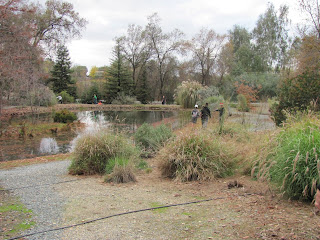“My Neighbor and My Friend”
When
Mister Rogers’ Neighborhood first became popular on television in
America, I w
as already out of high school, too old for children’s programs. Until
my husband Al and I watched the movie, A Beautiful Day in the Neighborhood,
and then upon a recommendation from a friend the documentary of his life, I
didn’t know very much about him personally.
We
were both impressed by Fred Rogers’ humility and expression of love for others.
Al describes him as “walking the talk.” Not only did he demonstrate love for
others, he told them so. Children seemed to recognize the genuine love that
emanated from him and were drawn to him, opening up and sharing their deep-down
feelings.
Mister
Rogers’ concern about the power of the television to shape and even manipulate vulnerable
young children motivated him to develop programs that would help kids grow in
positive ways. His goals were to help them learn about the world around them,
enable them to feel good about themselves, appreciate others and find
acceptable ways to express their feelings in a safe environment.
“What do you do with the mad that you feel,
when you feel so mad you could bite?” was the topic of one of the songs that he
composed. Fear, anger and frustration often lead to unacceptable behaviors like
biting—very common problems with preschool children. Those same emotions are also
common in adults, as we all well know.
In
the movie that was taken from a true story, Tom Hanks played the part of Fred
Rogers very well. When a journalist for
a popular magazine was given the assignment to interview Mister Rogers, a
strong bond was formed between the two men. As anger the journalist had harbored
toward his father came to the surface, Fred Rogers was able
to help him confront it. Rogers believed that love or the lack of it was at the
root of everything.
Not
only did Mister Rogers communicate with preschoolers, he had a profound
influence on many adults, including the journalist whose life was radically
changed. Often as he spoke to audiences, he would ask them to take one minute
of silence to think about the individual or individuals who had helped them
grow into the people they were at that moment.
“Anyone who has ever been
able to sustain good work has had at least one person and often many who have
believed in him or her. We just don’t get to be competent human beings without
a lot of different investments from others… From the time you were very
little, you’ve had people who have smiled you into smiling, people who have
talked you into talking, sung you into singing, loved you into loving.” (Commencement
speech in 2002 misterrogers.org)
When we truly believe that love
abounds and begin sharing it, our world will be changed. To Mister Rogers, a
fundamental principle was that each person is a beloved son or daughter of God.
Whenever we bring “light, joy, hope, faith, pardon and love” to our neighbor
and ourselves, we are living out our calling to be “Tikkun Olam,” repairers of creation.
Tikkun Olam is a Hebrew expression meaning “repair of the world; the establishment
of Godly qualities throughout the world.”
Jesus
talked about loving God with all of our heart, soul, mind and strength and
loving our neighbors too. This was the life that He lived, a life centered on
love. It is the kind of love that looks a person straight in the eye and says
first “I love you,” then asks “How can I help you?” regardless of that person’s
real or perceived differences.
Think
of God singing this song to each one of us…then think of singing this to
others!
“It's a beautiful day in this
neighborhood
A beautiful day for a neighbor
Would you be mine? Could you be mine?
“…Won't you be my
neighbor?
Won't you please, won't
you please?
Please, won't you be my
neighbor?
“…Neighbors are people
who are close to us
And friends are people who are close to our hearts
I like to think of you as my neighbor and my friend.”
(“Won't You Be My
Neighbor?” Fred Rogers)
Christmas is the
celebration of Christ’s coming into the world, the celebration of God’s great
statement of love for all mankind. May we receive His love and may we radiate
it outward to the hurting world in which we live.
*1John 4:19 NIV



.jpg)

Comments
Post a Comment